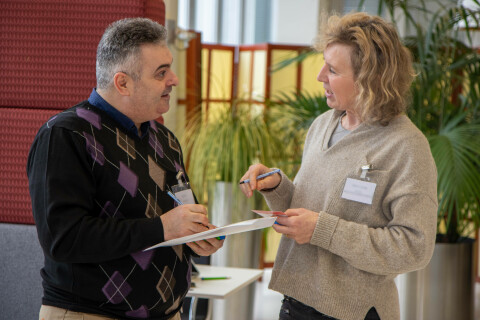
July 28th 2023
Status holders? Potential colleagues!
- Employment best practice
- Understanding & Insight
- OF THE
On World Refugee Day, the Ministry of the Interior and Kingdom Relations put its partnership with Refugee Talent Hub in the spotlight by sharing the article below.
Please note: this article was translated using a translator appIf you have fled your own country and cannot return, you must make your home somewhere else. An important part of this is having a job. We at the Ministry of the Interior and Kingdom Relations fully endorse this. That is why we as an organization have been working with Refugee Talent Hub since 2019.
Potential colleagues
“All people with a recognized refugee status ('status holders') have access to the Dutch labor market,” emphasizes Wilma Roozenboom, director of Refugee Talent Hub. “But that doesn't mean that everyone who wants to work is actually working.”
Currently, around 80,000 people with a refugee background are looking for a job. They often encounter obstacles, such as not yet mastering the Dutch language or the fact that their diplomas are not recognized. They also lack a professional network, and challenges that they often cannot do much about themselves play a role. Roozenboom: “Consider the perception that employers have of you as a candidate. Not every manager immediately sees status holders as potential colleagues, but they are. These are professionals who happened to be born somewhere else.”
Win win situation
That is precisely the reason why BZK has entered into a partnership with Refugee Talent Hub, agrees D&I colleague Fadoua El-Hamchaoui. “It cuts both ways: the BZK would like to support status holders in their integration and help them make the Netherlands their new home. At the same time, we are also open to new talent and are happy to deploy potential talents for our own organization.”
She sees various opportunities within the department, and refers, among other things, to the large number of vacancies in the areas of IT and finance. “The persistent tightness on the labor market offers additional opportunities. It means that we as an organization have to look at talent differently and recruit more competency-oriented.” Refugee Talent Hub's recruitment method fits in well with this, with small-scale meetings for refugees in the workplace where personal encounters are central.
IT talent
One of the departments that recently organized such a meeting together with Refugee Talent Hub is SSC-ICT. Last year, the ministry's IT branch hired three new colleagues with a refugee background through the partnership.
“I was so happy that I could come and work at BZK,” says Zakaria Alqabbani, a Syrian IT professional who has been working at SSC-ICT as an OSB integration specialist since last year. “My work gives me independence and autonomy. I really want to develop myself further and enjoy a challenge. I have a supervisor and a language coach who help me, and very nice colleagues who support me. Everyone wants me to be successful, which feels really nice.”
In addition to Zakaria, two more colleagues started at SSC-ICT after a meet-and-greet for IT professionals: a first-line user supporter and a junior software engineer. Fadoua El-Hamchaoui: “A successful match.” A second meet-and-greet at SSC-ICT is planned for next fall.
Inclusive workplace
According to Fadoua, the partnership with Refugee Talent Hub also fits in nicely with the ambitions surrounding diversity and inclusion. “For us, the integration of status holders is also part of our BZK objective to be a diverse and inclusive organization, or in other words an attractive employer for everyone.”
Refugee Talent Hub director Roozenboom also agrees: “The government is the largest employer in the Netherlands and not very diverse. We are happy that we can work together, step by step, on more opportunities for status holders within the ministry.”
Read also: Other perspectives , the story of Zakaria Alqabbani